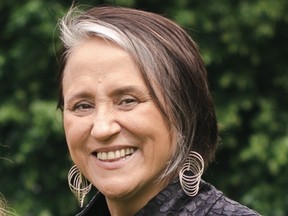Indigenous autobiography focus of Simon Fraser University professor Deanna Reder’s award-winning book: Autobiography as Indigenous Intellectual Tradition.

Reviews and recommendations are unbiased and products are independently selected. Postmedia may earn an affiliate commission from purchases made through links on this page.

Reder said the chance to write in a less formal, academic fashion — and use personal family stories as stepping off points — was an invigorating task that helped her work to “flow.”
“They helped me make connections,” said Reder about her stories throughout the book. “I really credit my mom for wiring my brain to think about things and stories.”
To date, the book has pulled in a few hefty awards including the Canada Prize in the Humanities and Social Sciences. This prize recognizes the impactful scholarly books in the humanities and social sciences.
As well, it was just recently awarded the Modern Language Association (MLA) Prize for Studies in Native American Literatures, Cultures and Languages.
Five must-read Indigenous autobiographies
We asked Reder to highlight a few must-read Indigenous autobiographies. Here are the titles she chose and, in her words, why she chose them:

Halfbreed, by Maria Campbell
When Métis author Maria Campbell’s Halfbreed was released in 1973, it was an immediate success. The book remains the most important autobiography written by an Indigenous author in Canada in the 20th century.
Written 50 years ago, at a time when Louis Riel was still considered a national traitor, Campbell tells the story of the heroism of the Métis who fought the government of Canada to retain control over their lands, only to be defeated.
Once Riel was hanged in 1885, Métis people lived in poverty on the margins of society.
Born in 1940, Campbell describes her childhood in her boisterous and high-spirited community, where she was taught Indigenous cultural values while also struggling with shame imposed upon her community by settlers who dismissed Métis claims and presence.
Readers cannot forget when Campbell’s Cheechum, or great-grandmother, warns her that settlers “try to make you hate your people.”
Writing her life story is one way she asserts her pride in who she is.
It is no exaggeration to say that Halfbreed inspired generations of Indigenous people to tell their stories. When searching for a copy, be sure to pick up the recently released 2019 version that includes a passage about a sexual assault by the RCMP that, just before the book’s initial release in 1973 and against Campbell’s wishes, the editors had removed.
Even better, order the audiobook and hear Campbell narrate her story to you.

For Joshua: An Ojibway Father Teaches his Son, by Richard Wagamese
One of the most popular books that I have ever taught is Richard Wagamese’s For Joshua: An Ojibway Father Teaches his Son (2002).
Wagamese recalls his memories of his difficult youth as a foster child and a runaway, balanced with the wisdom and peace he gains once he reconnects with his culture.
While the content is difficult, Wagamese writes with a lot of care, determined to share the lessons he has learned through stories and ceremony with a son he is estranged from.
Students appreciate the desire of the author to understand the choices he made as a youth and his attempt to repair past wrongs.

Nishga, by Jordan Abel
Jordan Abel’s 2021 book Nishga is a combination of meditations, images, court transcripts and poetry that may seem, at first glance, to be too avant-garde for the average reader.
However, it is only through a creative relaying of his story that we can feel the pain of family disconnection and the power of art to console.
This book grabs you by the heart.

A History of My Brief Body, by Billy-Ray Belcourt
A History of my Brief Body (2020) is a brilliant, brainy and intense memoir by a young, Indigenous, queer and closeted man from a small northern Cree community.
Belcourt navigates the anxieties of writing and of sexuality in the city in the throes of a genocide, in a context where gay life and Indigeneity are simultaneously marginalized by injurious public ideas.
Poetic, graphic, philosophical and thoughtful meditations created as radical art.

Who We Are, by Murray Sinclair
Read this book if you want to receive teachings from a trusted elder.
Who We Are is written by Sen. Murray Sinclair, the chair of the Indian Residential Schools Truth and Reconciliation Commission from 2009 to 2015, who recently passed away in November 2024.
He will inspire you to take stock of your life and commit yourself to learning about Canadian history and about your place in it. This is another example of a life story that is wonderful to listen to as an audiobook.
At first, the story is narrated by the author, who speaks sagely in a voice weakened by age; then Sinclair’s son Niigaanwewidam continues with the strong voice of a young man.
Finally, the book ends with a summary of the Truth and Reconciliation Commission (TRC) Report, narrated by the trusted voice of journalist Shelagh Rogers.